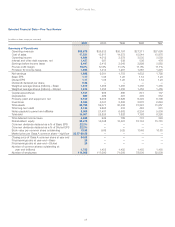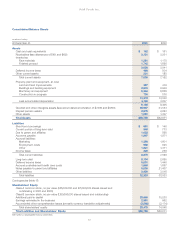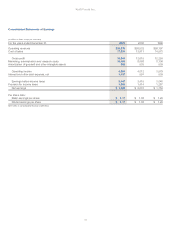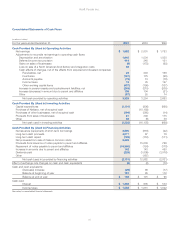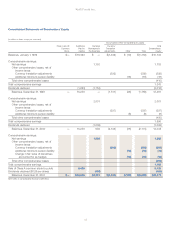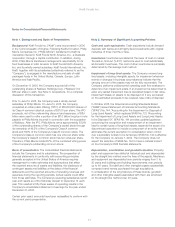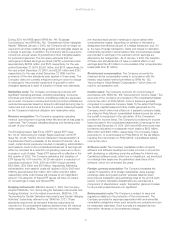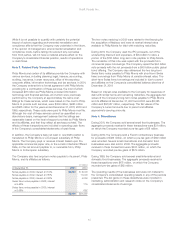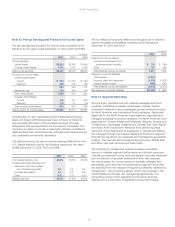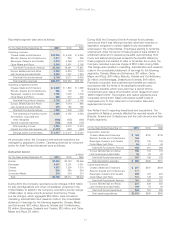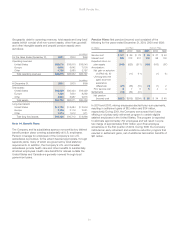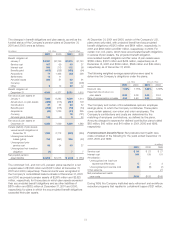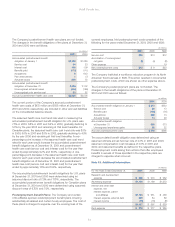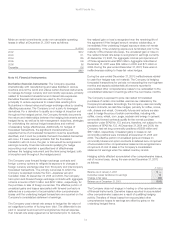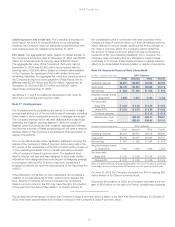Kraft 2001 Annual Report Download - page 51
Download and view the complete annual report
Please find page 51 of the 2001 Kraft annual report below. You can navigate through the pages in the report by either clicking on the pages listed below, or by using the keyword search tool below to find specific information within the annual report.
Kraft Foods Inc.
45
While it is not possible to quantify with certainty the potential
impact of actions regarding environmental remediation and
compliance efforts that the Company may undertake in the future,
in the opinion of management, environmental remediation and
compliance costs, before taking into account any recoveries
from third parties, will not have a material adverse effect on the
Company’s consolidated financial position, results of operations
or cash flows.
Note 3. Related Party Transactions:
Philip Morris and certain of its affiliates provide the Company with
various services, including planning, legal, treasury, accounting,
auditing, insurance, human resources, office of the secretary,
corporate affairs, information technology and tax services. In 2001,
the Company entered into a formal agreement with Philip Morris
providing for a continuation of these services, the cost of which
increased $91 million as Philip Morris provided information
technology and financial services, all of which were previously
performed by the Company at approximately the same cost.
Billings for these services, which were based on the cost to Philip
Morris to provide such services, were $339 million, $248 million
and $165 million for the years ended December 31, 2001, 2000 and
1999, respectively. These costs were paid to Philip Morris monthly.
Although the cost of these services cannot be quantified on a
stand-alone basis, management believes that the billings are
reasonable based on the level of support provided by Philip Morris
and its affiliates, and that they reflect all services provided. The
effects of these transactions are included in operating cash flows
in the Company’s consolidated statements of cash flows.
In addition, the Company’s daily net cash or overdraft position is
transferred to Philip Morris or a European subsidiary of Philip
Morris. The Company pays or receives interest based upon the
applicable commercial paper rate, or the London Interbank Offered
Rate, on the net amount payable to, or receivable from, Philip
Morris or its European subsidiary.
The Company also has long-term notes payable to its parent, Philip
Morris, and its affiliates as follows:
(in millions)
At December 31, 2001 2000
Notes payable in 2009, interest at 7.00% $5,000 $ 5,000
Notes payable in 2002, interest at 7.75% 11,000
Notes payable in 2002, interest at 7.40% 4,000
Swiss franc notes payable in 2008, interest
at 4.58% 715
Swiss franc notes payable in 2006, interest
at 3.58% 692
$5,000 $21,407
The two notes maturing in 2002 were related to the financing for
the acquisition of Nabisco and were at market interest rates
available to Philip Morris for debt with matching maturities.
During 2001, the Company used the IPO proceeds, net of the
underwriting discount and expenses, of $8.4 billion to retire a
portion of the $11.0 billion long-term note payable to Philip Morris.
The remainder of this note was repaid with the proceeds from
commercial paper borrowings. The Company repaid the $4.0 billion
note primarily with the net proceeds from a $4.0 billion public global
bond offering. The Company also refinanced the two long-term
Swiss franc notes payable to Philip Morris with short-term Swiss
franc borrowings from Philip Morris at variable interest rates. The
short-term Swiss franc borrowings are included in due to parent
and affiliates on the Company’s consolidated balance sheet as of
December 31, 2001.
Based on interest rates available to the Company for issuances of
debt with similar terms and remaining maturities, the aggregate fair
values of the Company’s long-term notes payable to Philip Morris
and its affiliates at December 31, 2001 and 2000 were $5,325
million and $21,357 million, respectively. The fair values of the
Company’s current amounts due to parent and affiliates
approximate carrying amounts.
Note 4. Divestitures:
During 2001, the Company sold several small food businesses. The
aggregate proceeds received in these transactions were $21 million,
on which the Company recorded a pre-tax gain of $8 million.
During 2000, the Company sold a French confectionery business
for proceeds of $251 million, on which a pre-tax gain of $139 million
was recorded. Several small international and domestic food
businesses were also sold in 2000. The aggregate proceeds
received in these transactions were $300 million, on which the
Company recorded pre-tax gains of $172 million.
During 1999, the Company sold several small international and
domestic food businesses. The aggregate proceeds received in
these transactions were $175 million, on which the Company
recorded pre-tax gains of $62 million.
The operating results of the businesses sold were not material to
the Company’s consolidated operating results in any of the periods
presented. Pre-tax gains on these divestitures were included in
marketing, administration and research costs on the Company’s
consolidated statements of earnings.





